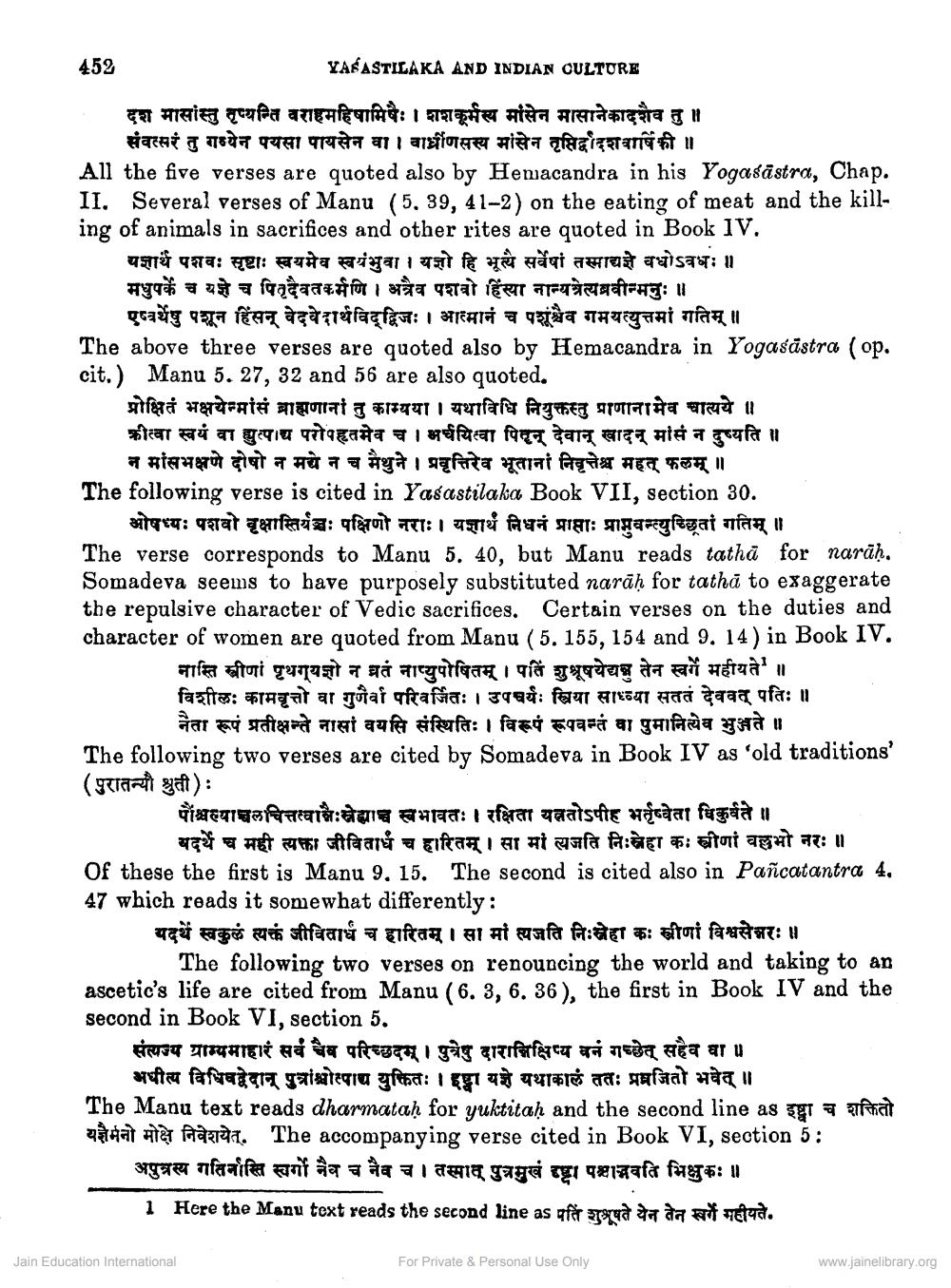________________
.
.
..
452
YASASTILAKA AND INDIAN CULTURE दश मासांस्तु तृप्यन्ति वराहमहिषामिषैः । शशकूर्मस्य मांसेन मासानेकादशैव तु ॥
संवत्सरं तु गव्येन पयसा पायसेन वा। वाणसस्य मांसेन तृप्तिद्वादशवार्षिकी॥ All the five verses are quoted also by Henacandra in his Yogasāstra, Chap. II. Several verses of Manu (5.39,41-2) on the eating of meat and the killing of animals in sacrifices and other rites are quoted in Book IV.
यज्ञार्थ पशवः सृष्टाः स्वयमेव स्वयंभुवा । यज्ञो हि भूत्यै सर्वेषां तस्माद्यज्ञे वधोऽवभः ॥ मधुपर्के च यज्ञे च पितृदेवतकर्मणि । अत्रैव पशवो हिंस्या नान्यत्रेत्यब्रवीन्मनुः ॥
एष्वर्थेषु पशून हिंसन् वेदवेदार्थविद्विजः । आत्मानं च पशृंश्चैव गमयत्युत्तमा गतिम् ।। The above three verses are quoted also by Hemacandra in Yogaśāstra (op. cit.) Manu 5. 27, 32 and 56 are also quoted.
प्रोक्षितं भक्षयेन्मांसं ब्राह्मणानां तु काम्यया । यथाविधि नियुक्तस्तु प्राणानामेव चात्यये ।। क्रीत्वा स्वयं वा ह्युत्पाद्य परोपहृतमेव च । भर्चयित्वा पितॄन् देवान् खादन् मांस न दुष्यति ॥
न मांसभक्षणे दोषो न मयेन च मैथुने । प्रवृत्तिरेव भूतानां निवृत्तेश्च महत् फलम् ॥ The following verse is cited in Yasastilaka Book VII, section 30.
ओषध्यः पशवो वृक्षास्तिर्यञ्चः पक्षिणो नराः। यज्ञार्थं निधनं प्राप्ताः प्रामवन्त्युच्छ्रितां गतिम् ॥ The verse corresponds to Manu 5. 40, but Manu reads tathā for narāḥ. Somadeva seems to have purposely substituted narāḥ for tathā to exaggerate the repulsive character of Vedic sacrifices. Certain verses on the duties and character of women are quoted from Manu (5. 155, 154 and 9. 14) in Book IV.
नास्ति स्त्रीणां पृथग्यज्ञो न व्रतं नाप्युपोषितम् । पतिं शुश्रूषयेद्यन्नु तेन स्वर्गे महीयते ॥ विशीलः कामवृत्तो वा गुणैर्वा परिवर्जितः । उपचर्यः स्त्रिया साध्व्या सततं देववत् पतिः ॥
नेता रूपं प्रतीक्षन्ते नासां वयसि संस्थितिः। विरूपं रूपवन्तं वा पुमानित्येव भुते ॥ The following two verses are cited by Somadeva in Book IV as 'old traditions' (पुरातन्यौ श्रुती):
पौश्चल्याचलचित्तवान्नैःनेह्याच स्वभावतः । रक्षिता यत्नतोऽपीह भर्तृष्वेता चिकुर्वते ॥
यदर्थे च मही त्यक्ता जीविताधं च हारितम् । सा मां त्यजति निःनेहा का स्त्रीणां वल्लभो नरः ॥ Of these the first is Manu 9. 15. The second is cited also in Parlicatantra 4. 47 which reads it somewhat differently:
यदर्थे स्वकुलं त्यक्तं जीविताधं च हारितम् । सा मां त्यजति निःस्नेहा कः स्त्रीणां विश्वसेन्नरः॥
The following two verses on renouncing the world and taking to an ascetic's life are cited from Manu (6.3.6.36). the first in Book IV and the second in Book VI, section 5.
संत्यज्य ग्राम्यमाहारं सर्व चैव परिच्छदम् । पुत्रेषु दारानिक्षिप्य वनं गच्छेत् सहैव वा ॥
अधीत्य विधिषद्वेदान् पुत्रांश्चोत्पाय युक्तितः । इष्वा यज्ञे यथाकालं ततः प्रमजितो भवेत् ॥ The Manu text reads dhar-matah for yuktitah and the second line as इष्ट्रा च शक्तितो यज्ञैर्मनो मोक्षे निवेशयेत्. The accompanying verse cited in Book VI, section 5:
अपुत्रस्य गतिर्नास्ति स्वर्गो नैव च नैव च । तस्मात् पुत्रमुखं दृष्ट्वा पश्चानवति भिक्षुकः ॥ 1 Here the Many text reads the second line as पति शषते येन तेन खर्गे महीयते.
Jain Education International
For Private & Personal Use Only
www.jainelibrary.org




